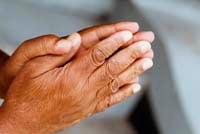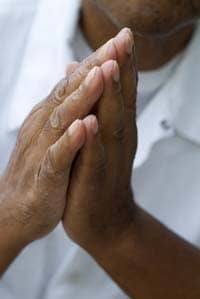 Pray for our president-especially as he navigates the treacherous waters of the National Day of Prayer.
Pray for our president-especially as he navigates the treacherous waters of the National Day of Prayer.
The idea for an official day of prayer dates back to 1952, when Billy Graham held a six-week campaign in Washington, DC, to thwart what he and other evangelicals saw as a trend toward godlessness at home and abroad.
Four years earlier, the Supreme Court had ruled that religious instruction in public schools was unconstitutional. And as Graham lobbied members of Congress to draft legislation to establish a national day of prayer, one senator described the measure as a bulwark against "the corrosive forces of communism which seek simultaneously to destroy our democratic way of life and the faith in an Almighty God on which it is based."
The day was designated as a floating holiday from the time President Harry S. Truman signed the legislation into law until the Reagan administration. In 1982, the three-year-old National Prayer Committee, an evangelical Christian organization, began to lobby for a fixed annual observance. Toward the end of his second term, President Reagan signed a new law designating the first Thursday in May as the National Day of Prayer.
Over the past two decades, the National Day of Prayer Task Force, based at the headquarters of Focus on the Family in Colorado Springs, has evolved from the National Prayer Committee to become the main source of energy for events related to the National Day of Prayer. During the presidency of George W. Bush, representatives of the NDPTF were invited to the White House each year for observances related to the holiday.
Now the man who campaigned on the promise of change is learning that not everyone wants things to be different. Though the new administration will issue a proclamation commemorating the National Day of Prayer, there will be no formal events marking the day at the White House.
"We are disappointed in the lack of participation by the Obama Administration," NDPTF chairman Shirley Dobson said in a statement released to the press. "At this time in our country's history, we would hope our President would recognize more fully the importance of prayer."
While Dobson's displeasure is currently leading the news around the National Day of Prayer, the holiday was generating controversy well before the current occupant of the White House weighed in on the matter.
Last year, the Freedom from Religion Foundation filed a lawsuit against Dobson, President Bush and others, claiming that through the NDPTF, Focus on the Family is "working hand-in-glove" with the government in a way that violates the Constitution's establishment clause.
Several progressive religious organizations, among them Jews on First and Interfaith Alliance, have petitioned President Obama to endorse an "Inclusive Prayer Day" as a way of countering what they see as religiously exclusivist policies at the NDPTF.
And several humanist groups are promoting a "National Day of Reason" as a secular alternative to the National Day of Prayer. (While others bow their heads on bended knee, the Center for Inquiry will be raising funds to help exonerate wrongfully convicted people through DNA testing. Atheists United is holding a blood drive.)
All of this begs a couple of important questions. Is the National Day of Prayer more divisive than unifying? And should a secular democracy even be holding such an observance? Join us in the Public Square discussion forum to share your opinion.
1/1/2000 5:00:00 AM




